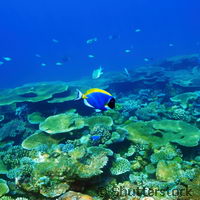Coral reefs that may be resistant to climate change
Coral reef ecosystems, some of the most valuable ecosystems on the planet, are often considered highly vulnerable to the impacts of climate change. However the seemingly delicate beauty of corals may be misleading - a new study recently published in Science magazine has identified coral populations that may be resistant to climate change. Researchers focused on a population of the table-top coral Acropora hyacinthus in American Samoa. According to their results, acclimatisation and adaptation have more or less an equal role in the reefs' developing a tolerance for hot temperatures. The study summary says, 'In less than two years, acclimatization achieves the same heat tolerance that we would expect from strong natural selection over many generations for these long-lived organisms.' The news offers hope to those who had feared the end of these magical underwater kingdoms. The study authors write, 'Our results show both short-term acclimatory and longer-term adaptive acquisition of climate resistance. Adding these adaptive abilities to ecosystem models is likely to slow predictions of demise for coral reef ecosystems.' According to Nature magazine, the temperatures experienced by the coral in American Samoa would kill off most coral reefs, and this is why it is interesting to the researchers. Nature quotes study author Stephen R. Palumbi who says they are just starting to understand how these Samoan corals thrive in such extreme conditions. '[Palumbi] thinks he might be able to harness that ability to create a reef of hardy coral with a chance of surviving the hot seas that are expected to result from climate change. Starting in August, he and his team are going to try to plant "the smartest future reef we can imagine".' Scientific America says that Palumbi is part of a small group of coral researchers around the world tackling such issues to throw threatened reefs a lifeline. 'Their ultimate intent is to launch a programme of 'human-assisted evolution', creating resistant corals in controlled nurseries and planting them in areas that have been - or will be - hard-hit by changing conditions.' This method of creating a 'designer reef' is not is not without controversy. Nature quotes coral geneticist Steve Vollmer who expresses concern that this is going too far down the 'slippery slope of altering natural systems'. Keeping our reefs in good health is vital. Not only does reef coral provide shelter and food to a wide variety of animals and act as nurseries for fishes, it also represents a 'cabinet' for natural medicines and plays an important role in absorbing carbon dioxide from the atmosphere. According to Scientific America, 19 % of the world's coral reefs have been lost since 1950 and another 35 % are threatened or in critical condition.For more information, please visit:Sciencehttp://www.sciencemag.org/content/early/2014/04/23/science.1251336



